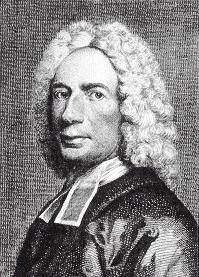Born in Southampton, England,in 1674, Watts was brought up in the home of a
committed Nonconformist — his father, also Isaac Watts, had been incarcerated
twice for his controversial views. At King Edward VI School (where one of the
houses is now named "Watts" in his honour), he learned Latin, Greek and Hebrew.
He displayed a propensity for rhyme at home, driving his parents to the point of
distraction on many occasions with his verse. Once, he had to explain how he
came to have his eyes open during prayers.
A little mouse for want of stairs
ran up a rope to say its prayers.
Receiving corporal punishment for this, he cried
O father, father, pity take
And I will no more verses make.[1]
Watts, unable to go to either Oxford or Cambridge on account of his
non-conformity, went to the Dissenting Academy at Stoke Newington in 1690, and
much of his life centred around that village, then a rural idyll but now part of
Inner London.
His education led him to the pastorate of a large Independent Chapel in London,
and he also found himself in the position of helping trainee preachers, despite
poor health. Taking work as a private tutor, he lived with the non-conformist
Hartopp family at Fleetwood House, Abney Park in Stoke Newington, and later in
the household of Sir Thomas Abney and Lady Mary Abney at Theobalds, Cheshunt, in
Hertfordshire, and at their second residence, Abney House, Stoke Newington.
Though a non-conformist, Sir Thomas practised occasional conformity to the
Church of England as necessitated by his being Lord Mayor of London 1700–01.
Likewise, Isaac Watts held religious opinions that were more non-denominational
or ecumenical than was at that time common for a non-conformist, having a
greater interest in promoting education and scholarship, than preaching for any
particular ministry.
On the death of Sir Thomas Abney, Watts moved permanently with his widow and her
remaining daughter to Abney House, a property that Mary had inherited from her
brother, along with title to the Manor itself. The beautiful grounds at Abney
Park, which became Watts' permanent home from 1736 to 1748, led down to an
island heronry in the Hackney Brook where he sought inspiration for the many
books and hymns he wrote.
He died in Stoke Newington and was buried in Bunhill Fields, having left behind
him a massive legacy, not only of hymns, but also of treatises, educational
works, essays and the like. His work was influential amongst independents and
early religious revivalists in his circle, amongst whom was Philip Doddridge,
who dedicated his best known work to Watts. On his death, Isaac Watts' papers
were given to Yale University, an institution with which he was connected
because of its being founded predominantly by fellow Independents
(Congregationalists).
Sacred music scholar Stephen Marini (2003) describes the ways in which Watts
contributed to English hymnody.[2] Notably, Watts led the way in the inclusion
in worship of "original songs of Christian experience"; that is, new poetry. The
older tradition limited itself to the poetry of the Bible, notably the Psalms.
This stemmed from the teachings of the 16th century Reformation leader John
Calvin, who initiated the practice of creating verse translations of the Psalms
in the vernacular for congregational singing.[3] Watts' introduction of
extra-Biblical poetry opened up a new era of Protestant hymnody as other poets
followed in his path.[4]
Watts also introduced a new way of rendering the Psalms in verse for church
services. The Psalms were originally written in Biblical Hebrew within the
religion of Judaism. Later, they were adopted into Christianity as part of the
Old Testament. Watts proposed that the metrical translations of the Psalms as
sung by Protestant Christians should give them a specifically Christian
perspective:
"While he granted that David [to whom authorship of the Psalms is traditionally
ascribed] was unquestionably a chosen instrument of God, Watts claimed that his
religious understanding could not have fully apprehended the truths later
revealed through Jesus Christ. The Psalms should therefore be "renovated" as if
David had been a Christian, or as Watts put it in the title of his 1719 metrical
psalter, they should be "imitated in the language of the New Testament."[2]
Marini discerns two particular trends in Watts' verses, which he calls
"emotional subjectivity" and "doctrinal objectivity". By the former he means
that "Watts' voice broke down the distance between poet and singer and invested
the text with personal spirituality." As an example of this he cites "When I
Survey the Wondrous Cross". By "doctrinal objectivity" Marini means that Watts
verse achieved an "axiomatic quality" that "presented Christian doctrinal
content with the explicit confidence that befits affirmations of faith." As
examples Marini cites the hymns "Joy to the World" as well as "From All That
Dwell Below the Skies":[5]
From all that dwell below the skies
Let the Creator's praise arise;
Let the Redeemer's name be sung
Through every land, by every tongue.
- One of his best known poems was an exhortation "Against Idleness And
Mischief" in Divine Songs for Children, a poem which was famously parodied
by Lewis Carroll in his book Alice's Adventures in Wonderland, in the poem
"How Doth the Little Crocodile", which is now better known than the
original.
- In the 1884 comic opera called Princess Ida, there is a punning
reference to Watts in Act I. At Princess Ida's women's university no males
of any kind are allowed, and the Princess's father, King Gama, relates that
"She'll scarcely suffer Dr. Watts' 'hymns'".
- Isaac Watts is commemorated in the Church of England, the Calendar of
Saints of the Lutheran Church - Missouri Synod and Evangelical Lutheran
Church in America on November 25 and in the Episcopal Church (USA) on
November 26.
In 1728, the University of Edinburgh awarded Watts a Doctor of Divinity
degree. Watts’ works include:

